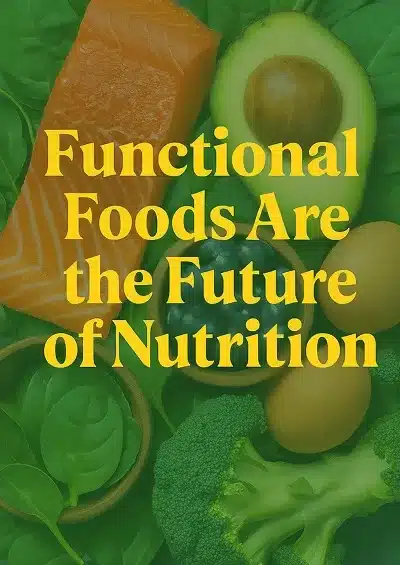Food isn’t just fuel anymore and honestly, it never was. For most of human history, food served a purpose beyond calories. It healed, energized, protected, and balanced the body. Somewhere along the way, we traded that wisdom for convenience, packaging, and flavor enhancers. But the tide is turning back.
Enter functional foods—whole foods and ingredients that do more than just feed you. They optimize you. And in a world full of fatigue, inflammation, and burnout, they might just be the future of how we eat.
So what makes a food “functional”? It’s any food that delivers health benefits beyond basic nutrition. Think gut support, brain fuel, immune boosters, or energy enhancers. These are ingredients that do something.
Let’s break it down.
1. Gut Health is Ground Zero
Want better mood, stronger immunity, and less inflammation? Start with your gut. Functional foods like fermented vegetables (kimchi, sauerkraut), kefir, kombucha, and prebiotic fibers feed the microbiome—the billions of bacteria that live in your digestive tract.
When your gut is balanced, your body works better. You absorb nutrients more efficiently. Your immune system stays sharp. Even your serotonin production (hello, better mood and sleep) improves. That’s a serious return on investment for a few forkfuls of kraut.
2. Anti-Inflammatory Powerhouses
Chronic inflammation is behind everything from joint pain to fatigue to brain fog. The standard American diet? It stokes the fire. Functional foods can help put it out.
Foods like turmeric, ginger, wild salmon (loaded with omega-3s), dark leafy greens, and green tea deliver anti-inflammatory compounds that calm the storm from the inside out. These aren’t exotic health fads—they’re real foods with real impact.
3. Fueling Brain and Body
Cognition, focus, stamina—these are non-negotiables in the modern world. Functional foods like pasture-raised eggs, blueberries, dark chocolate, and MCT-rich coconut oil feed the brain what it needs to perform.
Want clean energy? Skip the fourth cup of coffee. Try foods that stabilize blood sugar and support mitochondrial function—the engines inside your cells. That’s where real energy is made, not in a double shot of espresso.
4. Immune Defense You Can Eat
We’ve all gotten a crash course in immunity over the last few years. But the best defense isn’t a last-minute supplement—it’s daily habits.
Functional foods like mushrooms (especially reishi, shiitake, and lion’s mane), garlic, bone broth, and citrus fruits naturally support immune function. They’re packed with compounds that boost white blood cell activity and reduce viral load risk.
5. Convenience, Reimagined
Here’s the kicker: the future of functional foods isn’t about going back to the Stone Age. It’s about taking the best of ancestral wisdom and fitting it into modern life.
Think powder blends you can stir into water that support digestion or energy. Snack bars that double as cognitive fuel. Water enhancers that deliver electrolytes, antioxidants, or adaptogens without the sugar crash. Real ingredients. Real purpose.
That’s the direction we’re headed—away from empty calories and toward food that earns its place on your plate.
Final Thoughts
Functional foods aren’t a trend, they’re a return to something we forgot: that food should work for us, not just fill us. In a world full of stress, inflammation, and ultra-processed distractions, choosing functional foods is one of the smartest moves you can make.
Start simple. Add one functional food to your daily routine. Swap something packaged for something powerful. Your body will feel the shift—and thank you for it.

